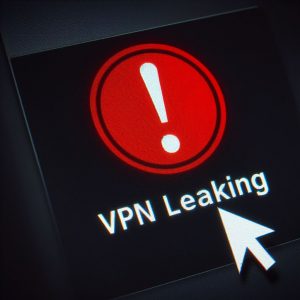Introduction
VPN leaking refers to the unintentional exposure of private internet activity and personal identity details despite using a Virtual Private Network meant to shield such information. As more people turn to VPN services to bolster online privacy and access restricted content globally, understanding potential data leaks and preventing them proves critical towards harnessing the expected protections confidently.
By examining common VPN vulnerability points around encryption gaps, misconfigurations, and software flaws that sabotage anonymity, users better recognize warning signs and avoid legal or financial risks linked to exposed web browsing, location, and usage patterns illegally obtained by cyber criminals or surveillance entities. Proactively auditing and hardening VPN setups through vendor transparency, protocol updates, and settings adjustments furnishes resilience against inadvertent privacy erosion even as threats evolve across the cyber landscape.

Prominent Types of VPN Leaks
While seemingly robust on the surface, VPN encryption depends on tunnel integrity from end to end with leakage capable through just minor technical, implementation or policy gaps. Two core categories of leaks involve either DNS traffic or device IP address visibility externally:
DNS Leaks
VPN services establish encrypted tunnels securing data in transit between your devices and their servers shielding online activity from prying eyes. However gaps within DNS infrastructure can still expose some queried hostnames unknowingly:
- DNS (Domain Name System) matches human-readable web addresses to machine hostnames necessary for routing traffic.
- Local ISP DNS servers, if used default when VPN active, capture all lookup requests and can potentially log or analyze this metadata.
- Using VPN provider maintained DNS inside tunnel boundaries prevents this visibility to enhance privacy.
Without overriding infrastructure DNS settings on devices, VPN encryption gets bypassed for name queries outside the secure pipeline allowing DNS logging and therefore minor data leakage.
IP Address Leaks
Just as DNS lookups can escape outside VPN tunnels, device IP addresses also risk public exposure from misconfigurations or errors:
- Software crashes can interrupt VPN connections without halting overall web traffic now unprotected.
- WebRTC, browser geolocation requests, or IPv6 routing annoyances can convey real IP addresses externally despite VPN usage elsewhere.
- Network middleware like antivirus, firewalls, or cellular carrier proxies often intermediate traffic flows bypassing VPN channels.
The result leaves permanent device identifiers like hardware IP addresses visibly peeking through cracked anonymity attempts around VPN usage.
Consequences of VPN Leaks
At first glance DNS and potential IP leaks seem trivial if other bulk traffic gets encrypted without issue from a VPN protection standpoint. But multiple security and privacy consequences manifest from these cracks in the virtual private network shield:
- Web/Location Tracking – ISPs, Authoritarians: Leaks grant visibility for logging and metadata analysis into user, household habits and movements enabling crackdowns or prosecution in restrictive regions.
- Data Theft/Malware Vulnerabilities – Cyber Criminals: External snooping on DNS queries provides reconnaissance for infecting devices, intercepting unencrypted sessions for credential theft or data breaches.
- Legal/Financial Risks – Vendors, Individuals: Proof of inadequate privacy protections required by policy or regulation precipitates substantial reputation damage, fines, and customer churn for VPN providers.
Leaks facilitate Oppressive Surveillance, Authoritarian Control, Stalking/Harassment and other perils counterweighting key ethical promises of VPN usage overall around protecting vulnerable user activity.
Notable Examples of VPN Leaks
Several notable incidents of VPN vulnerabilities bypassing core traffic encryption protections highlight the importance of ongoing independent audits validating actual privacy safeguards claimed:
- 2022: Numerous “no-log” VPN companies like Surfshark, ExpressVPN found participating in voluntary police reporting programs furnishing available customer metadata.
- 2021: ProtonVPN DNS leak flaws revealed sending traffic outside secure VPN tunnel via ISP DNS servers when enabled.
- 2018-2020: Several India-based “military-grade” VPNs leak IPv6 traffic around VPN connections exposing permanent device identifiers and locations.
Regular scrutiny by ethical hackers, academics, and industry analysts play a vital role benchmarking vendor marketing claims against provable leaks grandstanding brands promise at the expense of unwitting subscriber privacy. Let past debacles illustrate dangers complacency invites.

Preventing VPN Leaks
Utilizing a VPN bears responsibility choosing credible providers validating both policies and technical safeguards professionally to mitigate known vulnerabilities and remain transparent regarding limitations. Beyond vendor selection, users minimize leaks adopting common sense configurations:
Provider Precautions
- Prefer open-source VPN software allowing independent audit of tunnel code integrity
- Select well-funded teams continuously testing and updating infrastructure against latest threats
- Review policy fine print to confirm clearly stated protections around activity/connection logging
User Settings Checklist
- Utilize VPN provider DNS functionality inside tunnel to prevent ISP capture
- Disable IPv6 connectivity often enabling leakage around the VPN client
- Setkill switch to terminate internet traffic outright if VPN drops unexpectedly
Regular free leak testing offered at sites likeipleak.net combined with keeping VPN software patched furnishes reassurance on browsing safety. Seek providers publicly responding to vulnerability reports rather than downplaying flaws.
Data Breach Prevention Links
In an era of rampant data harvesting and profiling by tech intermediaries, VPN leaks indirectly exacerbate mass collection vulnerabilities:
- DNS & IP leaks furnish additional identifiers for tracking individuals amid lax privacy laws;
- Uncertain legal jurisdiction over most VPN operators relying on narrow privacy promises alone risk exposure through global intelligence sharing;
- Minimal logging should adhere to ‘Privacy by Design’ principles defaulting safely for users without affirmative consent.
- Applying heightened standards outlined in regulations like EU GDPR would meaningfully address ambiguity around appropriate use of VPN-related metadata otherwise likely abused by agencies benefiting from foggy jurisdiction and sworn secrecy circumventing public accountability over data sharing partnerships altogether too common globally.
By taking inspiration from emerging digital rights laws favoring individual privacy along with supporting tech providers committed to restraint by design when handling sensitive customer information as witnessed in industries like healthcare and finance, VPN users and ethical VPN operators alike gain protection against overreach minus need for reactive leak fixes down the road. Get involved advancing digital rights through technology caution and consent.
Conclusion
As growing VPN adoption intends to bolster online security, revelations of inadvertent DNS and IP leaks or outright policy deception around logging rupture basic expectations of enhanced safety. Scrutinizing providers, configuring added layers like burner credentials and testing for holes offers some reassurance. Ultimately the onus falls to all players – ethical VPN vendors avoiding slippery practices justifying breach potentialities from leak technicalities under terms of service alongside subscribers better grasping the shared burdens upholding privacy in a harsh digital age. Those values stand vital when both our personal dignity and secure communication tools hang in the balance.